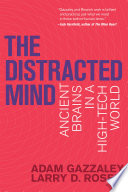

In 'The Distracted Mind', the authors, Adam Gazzaley and Larry Rosen, delve into the nature of distraction, explaining how it has evolved alongside technology. They discuss the cognitive mechanisms behind attention and how our brains are wired to seek out rewards, which can lead to a cycle of distraction. The book highlights the difference between attention and distraction and emphasizes that while our brains are capable of focusing on tasks, modern technology often hijacks this ability. By understanding the science behind distraction, readers can begin to recognize the triggers and patterns that lead them away from their tasks, empowering them to take control of their attention.
Continue readingThe authors explore the profound impact that technology, particularly smartphones and social media, has on our attention spans. They present research showing that the constant notifications and information overload can lead to decreased productivity and cognitive fatigue. This idea is crucial in understanding how our digital environment is designed to capture attention and how it can lead to a fragmented focus. The book argues that while technology offers numerous benefits, it also poses significant challenges to maintaining sustained attention and focus, which are essential for deep work and creativity.
Continue readingCognitive overload occurs when the amount of information we are processing exceeds our brain's capacity to manage it effectively. Gazzaley and Rosen illustrate how multitasking, which is often seen as a desirable skill, can actually lead to cognitive overload and diminished performance. They provide evidence that multitasking can reduce productivity by as much as 40% and can hinder learning and memory retention. Understanding this concept is vital for anyone looking to improve their efficiency and effectiveness in both personal and professional contexts.
Continue readingThe book offers practical strategies for managing distraction and enhancing focus. These strategies include setting boundaries with technology, creating distraction-free environments, and employing mindfulness techniques. The authors encourage readers to take control of their attention by being intentional about their technology use and adopting habits that promote deep work. They emphasize the importance of self-regulation and discipline in combating the allure of distractions, providing a roadmap for individuals looking to improve their focus and productivity.
Continue readingMindfulness practices are presented as a powerful tool for improving attention and reducing distraction. The authors discuss various mindfulness techniques, such as meditation and focused breathing, which can help individuals cultivate greater awareness of their thoughts and feelings. By training the mind to focus on the present moment, individuals can enhance their ability to concentrate and resist distractions. The book highlights the growing body of research supporting the benefits of mindfulness for cognitive function and emotional well-being, making a compelling case for its integration into daily life.
Continue readingDeep work, a term popularized by Cal Newport, refers to the ability to focus without distraction on cognitively demanding tasks. Gazzaley and Rosen argue that deep work is essential for achieving high levels of productivity and creativity. They discuss the challenges posed by the modern work environment, which often prioritizes shallow tasks and constant connectivity over focused, uninterrupted work. The authors encourage readers to prioritize deep work by scheduling dedicated time for it and minimizing distractions during those periods, ultimately leading to more meaningful and impactful outcomes.
Continue readingIn the concluding sections of the book, the authors reflect on the future of attention in a world increasingly dominated by distractions. They emphasize that while technology will continue to evolve, individuals have the power to shape their relationship with it. By adopting strategies to manage distraction and promoting a culture that values focused work, society can mitigate the adverse effects of distraction. The authors call for a collective effort to prioritize attention and mental well-being, suggesting that a more mindful approach to technology can lead to a healthier, more productive future.
Continue readingThe reading time for The Distracted Mind depends on the reader's pace. However, this concise book summary covers the 7 key ideas from The Distracted Mind, allowing you to quickly understand the main concepts, insights, and practical applications in around 23 min.
The Distracted Mind is definitely worth reading. The book covers essential topics including Understanding Distraction, The Impact of Technology on Attention, Cognitive Overload and Its Consequences, providing practical insights and actionable advice. Whether you read the full book or our concise summary, The Distracted Mind delivers valuable knowledge that can help you improve your understanding and apply these concepts in your personal or professional life.
The Distracted Mind was written by Adam Gazzaley, Larry D. Rosen.
If you enjoyed The Distracted Mind by Adam Gazzaley, Larry D. Rosen and want to explore similar topics or deepen your understanding, we highly recommend these related book summaries:
These books cover related themes, complementary concepts, and will help you build upon the knowledge gained from The Distracted Mind. Each of these summaries provides concise insights that can further enhance your understanding and practical application of the ideas presented in The Distracted Mind.